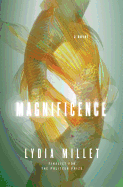
For years, Lydia Millet has been fashioning an ambitious trilogy. In How the Dead Dream (2008), a man named T. found consolation spending time with animals at the zoo after breaking into their pens. Then, in Ghost Lights (2011), T. is lost in the jungles of Belize, and Hal, the husband of one of his employees, sets out to find him, like Stanley in search of Livingston. T. returns; Hal doesn't. Magnificence begins.
Susan Lindley is grief-stricken over her husband's death, distraught with guilt over "her callous practice of adultery" (which was why Hal volunteered to track T. down). She's not in a very nice place emotionally, so Millet introduces her to a new place, a strange one. She has inherited a majestic home from a great-uncle she hardly knew. It's inhabited by animals--but the inhabitants of this jungle are stuffed. Uncle Albert was loved taxidermy, and the animals and murals in the mansion's eight bedrooms are laid out with geographic themes: Rainforest, Arctic, Himalayas and so on.
Susan quickly comes to love her comforting "glorious mansion," but then Millet complicates things. People begin showing up: an unfaithful husband, Susan's paraplegic daughter, strange old women, human skeletons. How Millet carefully manifests Susan's character within all this is what makes Magnificence so good. Her prose mirrors the world, mesmerizing in an understated way; emotions ripple beneath its poetic surface. Told beautifully in third person, it's itching to become first person, but Millet keeps it unsettled, disturbing and fulfilling in a splendid way. --Tom Lavoie, former publisher

